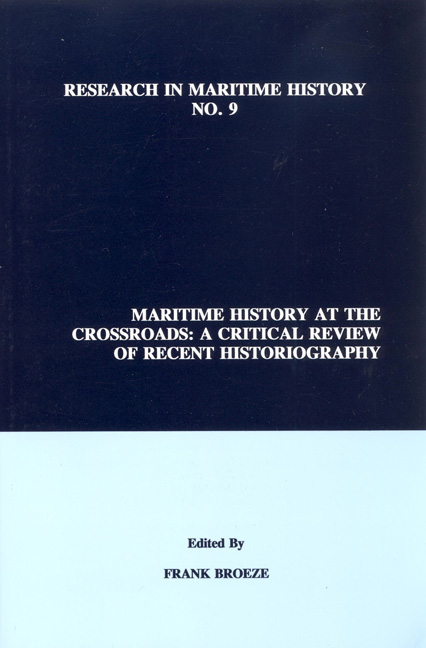Book contents
- Frontmatter
- Contents
- About the Editor
- Introduction
- Contributors
- “Maritime History in Australia”
- “The Enterprising Canadians: An Assessment of Canadian Maritime History since 1975”
- “The Historiography of Maritime China since c. 1975”
- “Danish Maritime History, 1976-1992: A Review”
- “German Maritime Historical Research since 1970: A Critical Survey”
- “The Maritime Historiography of Greece in Recent Decades”
- “Ibero-American Maritime History: Recent Advances in Research, 1975-1994”
- “Indian Maritime Historiography: West Coast Merchants in a Globalizing Economy”
- “Recent Developments in the Historiography of Maritime History in the Netherlands”
- “The Ottoman Empire: Recent Research on Shipping and Shipbuilding in the Sixteenth to Nineteenth Centuries”
- “The Progress of Maritime History in Spain since 1975”
- “Oceanic Historiography: The American Dimension”
“Indian Maritime Historiography: West Coast Merchants in a Globalizing Economy”
from Contributors
- Frontmatter
- Contents
- About the Editor
- Introduction
- Contributors
- “Maritime History in Australia”
- “The Enterprising Canadians: An Assessment of Canadian Maritime History since 1975”
- “The Historiography of Maritime China since c. 1975”
- “Danish Maritime History, 1976-1992: A Review”
- “German Maritime Historical Research since 1970: A Critical Survey”
- “The Maritime Historiography of Greece in Recent Decades”
- “Ibero-American Maritime History: Recent Advances in Research, 1975-1994”
- “Indian Maritime Historiography: West Coast Merchants in a Globalizing Economy”
- “Recent Developments in the Historiography of Maritime History in the Netherlands”
- “The Ottoman Empire: Recent Research on Shipping and Shipbuilding in the Sixteenth to Nineteenth Centuries”
- “The Progress of Maritime History in Spain since 1975”
- “Oceanic Historiography: The American Dimension”
Summary
The Indian Ocean and “Maritime Space“
India's maritime history since the sixteenth century is in an important sense the story of its integration into the capitalist world economy, a process that still continues. The manner by which this was achieved and the consequences of colonial rule for the peoples of the region have in recent years been central concerns of a number of historians. I intend this chapter to be both region- and theme-specific, focusing on the role of the west coast merchants and the ways they contributed to the articulation of the region into the modern world system. The evolution of commerce and shipping on India's west coast, however, cannot be separated from that of the Indian Ocean at large; in order to assess the historiography of the last three decades or so on western India one must also consider the literature on the Indian Ocean.
Departing decisively from the traditional accounts of Alan Villiers and Auguste Toussaint, Kenneth McPherson has recently offered a new synthesis of Indian Ocean history. Taking his cue from Fern and Braudel, McPherson uses the term “Indian Ocean” not just to delineate a geographic space - a body of water surrounded by specific littorals - but also to conceptualize a cultural and historical “world” with boundaries that ebbed and flowed in response to changing patterns of human activity on land and sea. This Indian Ocean is a social and cultural entity in constant flux which contains an enormous range of endeavours. Its unique maritime trading system set it apart from contiguous systems such as the Mediterranean and East Asia.
Niels Steensgaard, reviewing a number of previous studies, admits the usefulness of a concept such as “maritime space” when studying the Mediterranean, Atlantic and even the Baltic, but expresses some doubt about its applicability to the Indian Ocean. The paucity of reliable statistics, in his view, makes it difficult to argue that the Indian Ocean constituted an interdependent and distinct region. Recent interest in Indian Ocean studies has led to a number of trade histories, using primarily European sources. It is time, suggests Steensgaard, to shift the focus from commerce to the larger domestic economies, which would compel maritime historians to consider vital developments in agriculture and manufacturing. This might result in a different perspective on the issues being examined.
- Type
- Chapter
- Information
- Maritime History at the CrossroadsA Critical Review of Recent Historiography, pp. 171 - 192Publisher: Liverpool University PressPrint publication year: 1995



